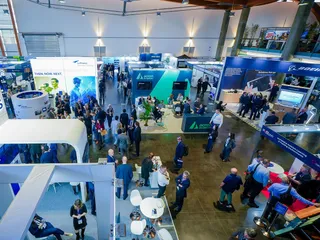EATS: Beyond Knowledge in Aviation Maintenance Training
Contact Our Team
For more information about how Halldale can add value to your marketing and promotional campaigns or to discuss event exhibitor and sponsorship opportunities, contact our team to find out more
The Americas -
holly.foster@halldale.com
Rest of World -
jeremy@halldale.com

Key Takeaways
- CBTA becomes recommended in five years: The aviation maintenance industry faces a regulatory requirement to implement competency-based training and assessment by 2030
- Knowledge alone is insufficient: Safety in aviation maintenance requires not just technical knowledge, but the ability to apply it under pressure with the right mindset
- Triangulated feedback approach: LTT uses in the Vocational Training a three-perspective assessment system (apprentice, trainer, journeyman) every three months to develop competence holistically
- CBTA is a continuous loop: Competency development isn't a one-time assessment but an ongoing cycle of experience, reflection, and improvement throughout a technician's career
- Cultural transformation needed: Future success requires creating "CBTA mentors" or "auditors" within organizations to embed competency development into daily operations
Beyond the 75% Pass Mark
Florian Bausch, Head of Competence Center Type Training at Lufthansa Technical Training (LTT), opened his presentation at EATS 2025 with a candid admission: there is still a lot of work to do.
Despite aviation's technological advances, he argued that the industry's approach to maintenance training has lagged the complexity of modern aircraft and operations.
"Training in aviation maintenance is non-negotiable, but knowledge alone will not guarantee safety," Bausch stated. "We need to teach people that it depends on how we apply that knowledge—how to make decisions under pressure. We need to embrace a mindset in technicians to prioritize reliability and resilience to the highest priority."
Competency-Based Training and Assessment (CBTA) enters the picture here—not just as a framework, but as what Bausch calls "a philosophy" that shifts focus from "what we know to how we act."
The Turning Point: Five Years Until CBTA Becomes Recommended.
Bausch shared an important regulatory context: "In five years, it will be official that we should have CBTA in our training." This timeline pressures the industry to shift from traditional training methods that "served us well until this point today" to a more comprehensive approach.
"Technical skills are still essential, but they are not enough anymore," he emphasized. "We need professionals who combine expertise, who adapt, and who have a safety-driven attitude today."
A Personal Journey: From Apprentice to Advocate
To illustrate CBTA's principles, Bausch shared his own 26-year learning journey in aviation maintenance, beginning as a 19-year-old apprentice in 1999. His story revealed the gap between traditional training and real-world competency.
"When I completed my training back then, competence-based training didn't exist yet," he recalled. "For us, it was like the magic mark was 75%—if you're below, you failed. If you're above, you passed. If you failed, you got another piece of metal. Try to Do it again. Do it better. But how?. Development communication was lacking.
His real education began in 2003, when he transitioned from the classroom to the hangar floor. "I learned how to apply my knowledge and competencies, still with a supervisor above me, so it was safe to make mistakes. But I learned how to make my decisions. I learned how to take ownership and stand behind my choices under pressure."
The turning point came during his Aircraft on Ground (AOG) assignments abroad, starting in 2005. "I learned to solve problems on my own. Nobody was there to help me directly. I learned to coordinate not only with technicians but with pilots and crews, which made me grow. I learned how to adapt my knowledge and stay calm under pressure, because knowledge alone, if you don't adapt, it keeps you within boundaries."
By 2009, when Bausch became a technical trainer, he faced a revelation: "Passing the knowledge was not enough. We must teach competence and mindset.
LTT's Three-Pillar Approach to CBTA
Lufthansa Technical Training has developed a comprehensive CBTA system across three training pillars, serving over 500 customers worldwide with more than 1,200 training products and 100 experienced instructors.
The foundation begins with apprentices, guided by a quote from John C. Maxwell that has become LTT's philosophy: "Fail early, fail often, but always fail forward."
"We're giving apprentices the chance in a secure environment to make failures, to fail fast, to fail quickly, fail often," Bausch explained. "But the only thing I expect from everybody is to learn. Learn if you make a fault, learn and make it better the next time."
The vocational program uses a sophisticated "methodical development dialog"—a triangulated feedback approach involving the apprentice, trainer, and journeyman (the supervisor who guides hands-on aircraft work). This assessment is performed across four competencies several times in different areas: work behavior, work performance, team behavior, and technical knowledge. Each apprentice will have 6 to 7 assessments.
"Every apprentice is on the same level as the trainer, on the same level as the journeyman," Bausch noted. "This encourages reflection and growth and promotes all apprentices to self-awareness and continuous improvement through structured dialogue and reflection because they're equal."
The approach provides transparent feedback from three perspectives and "defines concrete development actions for each apprentice and does not only rate the people like I experienced 26 years ago."
Basic and Type Training: Building on the Foundation
The second pillar, basic training (Categories A, B1, B2), expands knowledge and skills while introducing "advanced safety-driven behaviors" and preparing technicians for complex systems. Bausch acknowledged this area needs more structure but is progressing intentionally.
Type training—Bausch's direct responsibility—ensures precision and responsibility while gaining specific system knowledge and "shaping CBTA principles through case studies."
"Through these stages, we don't just teach procedures. We build professionals who think critically, act responsibly and adapt confidently," he said.
All trainees undergo competency-based assessment at the end of practical training to evaluate their mindset, attitude, and knowledge. Though Bausch admitted even the theoretical portion "could have more structure in how to assess competence."
The Future: CBTA as a Continuous Loop
Bausch envisions CBTA not as isolated training events but as a complete cycle spanning vocational training, basic training, type training, Part 145 maintenance organizations, and OEMs.
"Competence is not taught in a single moment. It evolves throughout experience and reflection—a lifelong" process, he explained.
One of Bausch's most innovative ideas is to create "CBTA mentors" or "CBTA auditors" within organizations—trained technicians who embed competency development into daily operations.
"They could act as CBTA mentors or maybe CBTA auditors in their own Part 145 as a member of a team in the organization," he proposed. "They question deeply. They lead with purpose, and they respond to challenges with assurance in every shift, in every team."
These mentors would promote ongoing improvement: "We need to reflect after each event. We need to learn and improve as we go about our daily work. We need to review what went well, identify what could be better, and figure out how to incorporate those insights into our routines."
Bausch's vision extends beyond individual organizations: "Imagine that these auditors ensure that competence development becomes part of the culture in every Part 147, in every Part 145, at the MROs and at the OEMs."
Pioneers, Not Spectators
Bausch concluded with a call to action that reframed the industry's mission: "The future of aviation training is not about adding more information. It's about crafting minds that challenge the norm, act wisely, and evolve with confidence."
"CBTA gives us the tools to achieve this, but it requires collaboration, commitment and vision," he emphasized. "Let's shape this future together, not as spectators, but as pioneers."
If you're exploring how competency-based training is reshaping maintenance, join us at WATS 2026 in Orlando, from 5-7 May, for forward-looking discussions on the future of aviation maintenance training.


